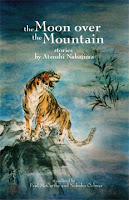 Author: Atsushi Nakajima
Author: Atsushi Nakajima
Translator: Paul McCarthy and Nobuko Ochner
U.S. publisher: Autumn Hill Books
ISBN: 9780982746608
Released: February 2011
Original release: 1942-1959
The publication of The Moon Over the Mountain and Other Stories by Autumn Hill Books in 2011 was the first time that any of Atsushi Nakajima’s works were made available in English. My introduction to Nakajima was through his short story “Sandy’s Lament” which was included in the first issue of the English-language edition of the Japanese literary journal Monkey Business, also in 2011. The story was probably my favorite piece in the entire volume and so I immediately sought out The Moon Over the Mountain, translated by Paul McCarthy and Nobuko Ochner as part of the Japanese Literature Publishing Project. Nakajima made his literary debut in 1934. Unfortunately, he died in 1942 at the age of 33, just as his writing career was beginning to take off. Before his death, Nakajima produced many works, mostly short stories and novellas, which are frequently included in anthologies in Japan. Even now, Nakajima continues to have a small but devoted fanbase in which I am happy to include myself as a member.
The Moon Over the Mountain and Other Stories collects six of Nakajima’s short works as well as an excellent afterword by the translators about Nakajima, the context of his writings, and his place in Japanese literary history. The volume begins with the titular story and one of Nakajima’s most well known works, “The Moon Over the Mountain,” in which an aspiring poet turns into a tiger instead. This is followed by three more short stories. In “The Master” a man strives to become the world’s greatest archer. “The Bull Man” is a clever but ugly illegitimate son of a government official. Men coveting a beautiful woman in “Forebodings” bring about their own downfall. Next is the novella “The Disciple” which follows the life of Zilu, a famous disciple of Confucius. “The Rebirth of Wujing” features the eponymous Wujing searching for the meaning of existence before he joins the monk Tripitaka on his journey westward. This is followed by another short story, “Waxing and Waning,” about political unrest in the state of Wei. The misfortunes of the Han Dynasty cavalry commander Li Ling and the historian who chronicles the events are the focus of the novella “Li Ling.” Finally, the book closes with “On Admiration: Notes by the Monk Wujing.” (This actually happens to be a different translation of the story “Sandy’s Lament.”)
Nakajima was a scholar and teacher of Chinese classics. Their influence on his works collected in The Moon Over the Mountain and Other Stories is readily apparent. All of the stories take place in ancient China and are based on Chinese mythologies, legends, philosophies, and histories. Some of the immediate inspiration in The Moon Over the Mountain collection is taken from such works as the Analects of Confucius, Records of the Grand Historian, and the ever popular The Journey to the West among others. Nakajima respects his source material, even adopting a style similar to the originals. While he may use and combine several different texts in the creation of a single story, the heart of the tales remain mostly unchanged. Classic Chinese literature has always been an important component in the development of Japanese literature and Nakajima builds on that tradition.
I absolutely loved The Moon Over the Mountain and Other Stories. Nakajima’s writing has an elegance to it as well as a subtle sense of humor that is easy to overlook. Although a reader who is already versed in the Chinese classics from which Nakajima draws may be at a slight advantage and will be able to appreciate his stories on multiple levels, it is not at all necessary to have read the source material to enjoy Nakajima’s interpretations. I did find the order of the stories in The Moon Over the Mountain to be a little odd. Personally, I would have kept stories featuring the same characters together rather tan splitting them up. Granted, each of Nakajima’s short works stands very well on its own. It is probably safe to say that it is unlikely that much more of Nakajima’s work will be translated into English; I am incredibly happy to at least have The Moon Over the Mountain and Other Stories available.

[…] so I’m glad that Kate made mention of The Moon Over the Mountain. I’m a big fan of Atsushi Nakajima’s work and the first volume of Maiden’s Bookshelf was beautifully done, so I’m particularly […]